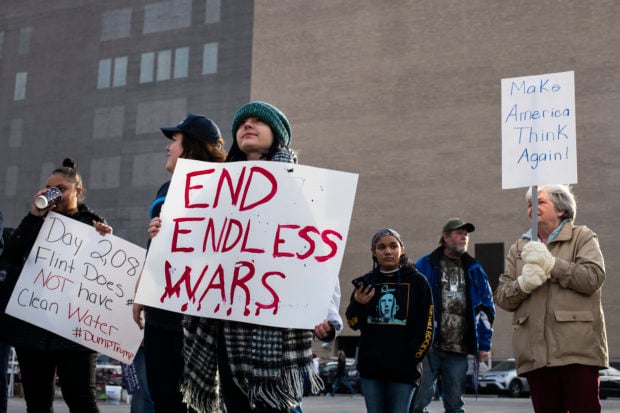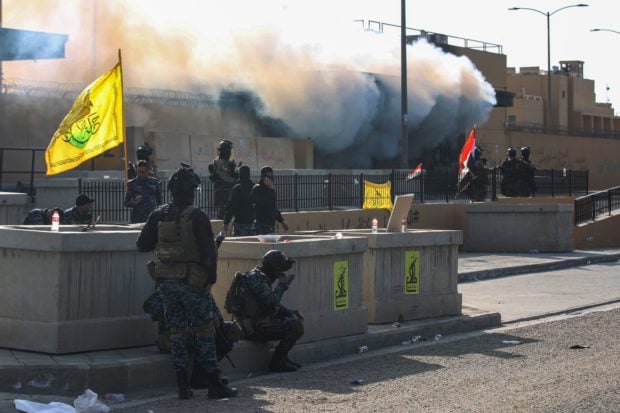President Donald Trump hit back at critics of his decision to drone strike Iranian military leader Qasem Soleimani in a Monday tweet, claiming it “doesn’t really matter” whether or not Soleimani was planning an “imminent attack” against the United States.
The president’s tweet is just the latest defense of the strike against Soleimani, which has been panned by many, including Democrats and the media, as impulsive and unconstitutional. The State Department initially justified the strike by warning that Soleimani was planning an “imminent attack” on U.S. facilities and service members in the Middle East, but recent inconsistencies among administration officials and the president have called that version of events into question. (RELATED: Soleimani Was Planning ‘Imminent Attacks’ That Could Have Killed Hundreds Of Americans, Top US Official Says)
“The Fake News media and their Democrat Partners are working hard to determine whether or not the future attack by terrorist Soleimani was ‘imminent’ or not, & was my team in agreement,” Trump tweeted. “The answer to both is a strong YES., but it doesn’t really matter because of his horrible past!”
The Fake News Media and their Democrat Partners are working hard to determine whether or not the future attack by terrorist Soleimani was “imminent” or not, & was my team in agreement. The answer to both is a strong YES., but it doesn’t really matter because of his horrible past!
— Donald J. Trump (@realDonaldTrump) January 13, 2020
Soleimani was reportedly responsible for the deaths of hundreds of Americans and was considered a top terror target, but the presence of an imminent threat would arguably neuter claims that the president needed congressional authority to approve the strike.
Secretary of State Mike Pompeo notably told reporters during a briefing earlier in January that he had “specific information” regarding an attack on U.S. embassies just one day after telling Fox News’ Laura Ingraham that officials “don’t know precisely when and we don’t know precisely where” that attack would occur.
Pompeo insisted those two claims were consistent, explaining during the briefing, “I don’t know exactly which minute. We don’t know exactly which day it would have been executed, but it was very clear: Qassem Soleimani himself was plotting a broad, large-scale attack against American interests, and those attacks were imminent.”

TOLEDO, OH – JANUARY 09: Protestors stand outside before a campaign rally for President Donald Trump at the Huntington Center on January 9, 2020 in Toledo, Ohio. President Trump won the swing state of Ohio in 2016 by eight points over his opponent Hillary Clinton. (Photo by Brittany Greeson/Getty Images)
Trump later told Ingraham during a separate interview that he believed four U.S. embassies would be targeted in Soleimani’s attack. The president added that the military general wanted to “blow up” the embassy in Iraq, which was stormed and burned by protesters in early January after the U.S. launched defensive strikes in the region.
Defense Secretary Mark Esper admitted on CNN that he “didn’t see” a specific piece of evidence that the embassies were under threat, instead stating, “what the president said was he believed that it probably and could have been attacks against additional embassies.” (RELATED: Mark Esper Defends Strike On Soleimani, Says It’s Better Than Having ‘Flag-Draped Coffins Come Home’)

Iraqi security forces are deployed in front of the US embassy in the capital Baghdad, after an order from the Hashed al-Shaabi paramilitary force to supporters to leave the compound on January 1, 2020. – Thousands of Iraqi supporters of the largely Iranian-trained Hashed had encircled and vandalised the embassy compound yesterday, outraged by US air strikes that killed 25 fighters of the military network over the weekend.(Photo by AHMAD AL-RUBAYE/AFP via Getty Images)
“I shared that view,” Esper said.
A new report from NBC News further complicates the administration’s “imminent attack” defense. According to five current and former senior administration officials who spoke to NBC, Trump approved the strike on Soleimani with certain conditions seven months ago.
Trump, tempering his more hawkish advisers this past June, said he only wanted to go ahead with the strike if Iran killed an American citizen. The president also wanted to have the final say on the strike when the time came.
The fact that the strike was pre-approved months ago further suggests that killing Soleimani was more about retaliation against Iran for killing an American contractor than it was about an alleged “imminent attack.”


